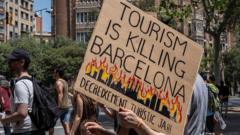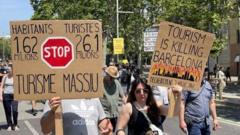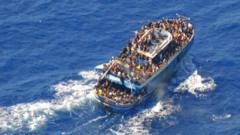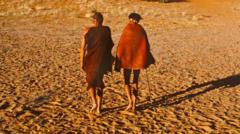As Santorini becomes increasingly impacted by a barrage of earthquakes, local hoteliers and workers contemplate a difficult summer ahead. Despite government intervention, experts warn that the island's tourism sector, vital to Greece's GDP, may face severe ramifications if conditions persist.
Santorini's Tourist Season at Risk Amid Ongoing Earthquakes
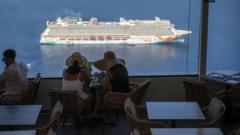
Santorini's Tourist Season at Risk Amid Ongoing Earthquakes
The Greek island of Santorini faces uncertainty as a series of earthquakes shakes the region, prompting concerns about a declining tourist season.
Santorini, known for its spectacular views and vibrant tourism, is bracing for a tumultuous summer season as a series of earthquakes has shaken the island since January. As the first cruise ships are expected to arrive this month and Easter holidays approach, both locals and industry professionals express growing concern over potential impacts on tourism, a crucial economic lifeline for the island.
Antonis Pagonis, president of Greece's Association of Hoteliers, indicated a noticeable decrease in bookings over recent days. “We hope this will be short-lived,” he commented, optimistic though cautious about the month ahead. The island generally welcomes tens of thousands of tourists daily during peak months, which puts immense pressure on the local workforce, historically supplemented by seasonal workers from both Greece and abroad.
The seismic activity has led some prospective workers to reconsider their summer employment plans. Manos, a seasoned bartender who has worked in Santorini for five summers, mentioned, “I’m worried there won’t be enough tourists. If the season is weak, I might not make as much money, or they might not need me for the whole summer.” This uncertainty led him to accept a position in Corfu instead of returning to Santorini.
With construction on hotels at a standstill due to fears of aftershocks, hotel owners have urged the government to support the workforce financially during this period. Pagonis remarked on the dire need for government aid, noting, “We have submitted a series of proposals to the government to support both the existing workforce on the island and those looking to work during the season.”
The government has taken steps to address the immediate threats posed by the earthquakes, including deploying rescue teams and declaring a state of emergency. However, industry leaders are calling for long-term investment in infrastructure, particularly improvements to the island's port and stricter regulations for private accommodations that may not meet the same safety standards as hotels.
Santorini generates approximately €5.9 billion annually, accounting for around 2.5% of Greece's GDP. Though there have not been widespread cancellations yet, many hoteliers report decreased booking numbers. If the seismic threats continue over the coming month, businesses may face dire consequences.
During a visit to the island, Prime Minister Kyriakos Mitsotakis emphasized the need to protect Santorini's reputation as a premier destination, declaring, “It is our duty to protect it, preserve its reputation, and ensure that 2025 is another excellent year for tourism.” As the season approaches, hotel owner Margarita Karamolegkou acknowledged the possibility of delaying her hotel openings but remains hopeful about the future. “We have been in this business for decades, operating at the highest level,” she stated optimistically. “I am confident that even with fewer staff, our services will remain exceptional.”



